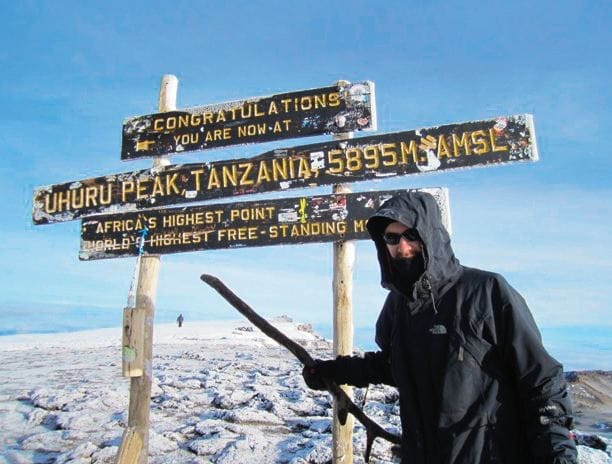Mike King, WG’10, and his three brothers held an informal innovation tournament on a roof bar in Austin, TX. The brothers King had just finished a LIVESTRONG Challenge in honor of their father and Wharton instructor Paul King, who had been diagnosed with prostate cancer. The Kings brainstormed over “what can we do to take our fundraising and support to another level,” and Mike’s answer was Survivor Summit Foundation.
This June, the charity will take 20 people, many of them cancer survivors, on a trek to the top of Mount Kilimanjaro in Tanzania. Participants must raise at least $10,000, with all proceeds going to the Lance Armstrong Foundation.
Survivor Summit officially launched in late December 2011, yet its first venture is fully booked. Its success can be traced, in part, to its rare partnership with LIVESTRONG—this is only the fifth time the charity famous for its yellow bracelets has agreed to such a relationship. On the day of Survivor Summit’s launch, both the CEO of LIVESTRONG and Lance Armstrong tweeted about it. (King was the first-ever Wharton MBA to intern with LIVESTRONG. See “The Road Less Traveled,” Wharton Magazine, fall 2009, P. 21.)
On that first day, people from 72 countries visited the Survivor Summit website. King watched the Web traffic trend up like a “hockey stick.”
“This overwhelming response was a powerful reminder of how many cancer affects,” he says.
King has also been powered by Wharton. If the Kilimanjaro trek sounds similar to Wharton Leadership Ventures (WLV), that’s because it is. King participated when he was a student. He also took courses from Karl Ulrich, CIBC Professor of Entrepreneurship and eCommerce, vice dean of innovation and proponent of the innovation tournament concept.
“When I think that Mike is using skills and inspiration that he learned at Wharton from professors like Jeff Klein and Ulrich for Survivor Summit, I feel a great sense of optimism that Wharton is helping to shape leaders who have a strong sense of social responsibility and who will make our world a kinder and better place,” says his father Paul.
Wharton’s influence extends beyond King’s two-year MBA. He contacted Ulrich by email when he was getting the Survivor Summit site off the ground, and Ulrich responded with advice.
“Which I, in essence, followed to a T,” King says.
He also reached out to Klein, director of Wharton’s Graduate Leadership Program whom King met while participating in WLV.
“My first reaction when he told me his plan was, ‘He’ll pull this off,’” Klein says. “In launching the Survivor Summit, Mike has incorporated key [Wharton] lessons from strategy, negotiations, operations management, entrepreneurship, marketing, finance and leadership.”
Klein helped provide a “stress test” for the Survivor Summit business plan, and he put King in touch with Chris Warner, famed mountaineer, proprietor of Earth Treks and frequent leader on WLV trips. Warner will head the Kilimanjaro trip and aided King in programming a “leadership and educational component” into the venture, King says.
With this year’s expedition already taking care of itself, according to King, he is looking toward the future. More than a dozen people are on the list to participate in 2013. He also eyes the possibility of expanding the charity’s “What’s Your Summit?” initiative, through which survivors identify their own goals or challenges to overcome. He foresees an expansion of trek offerings and outreach to other survivors, such as military veterans or individuals who have overcome diseases other than cancer.
Whatever King does, he plans to continue taking it to “another level” through his charity’s three goals: to provide hope and inspiration, to shatter stigma and to raise funds for innovative charities. King is joined on the charity’s board by his father; brothers Paul, Brian and Matt; and friend Chris Callahan.

























